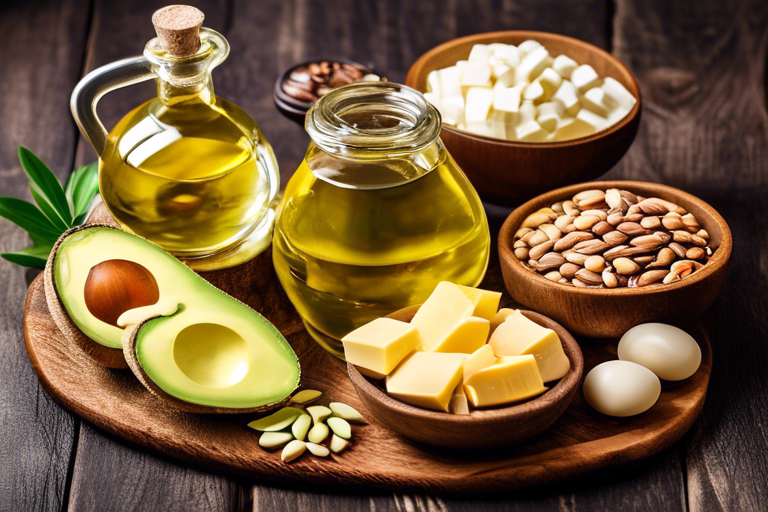Introduction to Healthy Fats
When it comes to maintaining a healthy diet, there is often confusion surrounding the role of fats. Many people believe that all fats are bad for you and should be avoided at all costs. However, this couldn’t be further from the truth. Incorporating healthy fats into your diet is essential for overall well-being.
Healthy fats are a crucial part of a balanced diet as they provide energy, support cell growth, protect organs, and help the body absorb certain vitamins. They also play a vital role in brain function and hormone production. So, if you’ve been shying away from fats, it’s time to reconsider and learn how to incorporate healthy fats into your meals and snacks.
Why Healthy Fats Are Important for Your Diet
Healthy fats are an essential macronutrient that our bodies need to function properly. They are a concentrated source of energy and are necessary for the absorption of fat-soluble vitamins such as vitamins A, D, E, and K. Additionally, healthy fats help maintain healthy skin, hair, and nails, and they promote proper brain function.
Contrary to popular belief, healthy fats do not necessarily lead to weight gain. They can help you lose weight by keeping you satisfied and reducing cravings. Healthy fats are more satiating than carbohydrates and protein, which means they can help control your appetite and prevent overeating.
Moreover, healthy fats have been shown to have numerous benefits for heart health. They can help lower bad cholesterol levels, reduce inflammation, and decrease the risk of heart disease. By incorporating healthy fats into your diet, you can improve your overall health and well-being.
Different Types of Healthy Fats
Not all fats are created equal. It’s important to understand the different types of healthy fats and how they can benefit your body. There are three main types of healthy fats: monounsaturated fats, polyunsaturated fats, and omega-3 fatty acids.
Monounsaturated fats are found in foods like avocados, olive oil, and nuts. They are known for their heart-healthy benefits and can help reduce bad cholesterol levels. Polyunsaturated fats can be found in foods such as sunflower oil, soybean oil, and fatty fish. They are essential fats, meaning that our bodies cannot produce them on their own, and they play a crucial role in brain function and cell growth.
Omega-3 fatty acids are a type of polyunsaturated fat that has received a lot of attention for its health benefits. They are found in fatty fish like salmon, mackerel, and sardines, as well as in walnuts and flaxseeds. Omega-3s have been shown to reduce inflammation, improve heart health, and support brain function.
Sources of Healthy Fats – Plant-Based and Animal-Based
Incorporating healthy fats into your diet is easy once you know where to find them. Whether you follow a plant-based or animal-based diet, there are plenty of options available to you.
If you prefer plant-based sources of healthy fats, you can include foods like avocados, nuts, seeds, and olive oil in your meals. Avocados are not only rich in healthy fats but also provide a good amount of fiber and other essential nutrients. Nuts and seeds, such as almonds, chia seeds, and flaxseeds, are excellent sources of healthy fats and can be added to salads, and smoothies, or enjoyed as a snack.
On the other hand, if you consume animal products, you can opt for fatty fish like salmon, trout, and sardines. These fish are not only high in healthy fats but also provide a good source of high-quality protein. Other animal-based sources of healthy fats include eggs, dairy products like Greek yogurt and cheese, and lean cuts of meat.
Health Benefits of Incorporating Healthy Fats into Your Diet
Incorporating healthy fats into your diet can have numerous health benefits. Firstly, they provide a steady source of energy, which is essential for optimal physical and mental performance. Healthy fats also support the growth and development of cells, tissues, and organs in the body.
Furthermore, healthy fats play a crucial role in brain health. The brain is made up of nearly 60% fat, and consuming adequate amounts of healthy fats is essential for proper brain function. Omega-3 fatty acids, in particular, have been shown to improve cognitive function and protect against age-related cognitive decline.
Additionally, healthy fats have a positive impact on heart health. They can help lower bad cholesterol levels, reduce inflammation, and improve blood pressure. By incorporating healthy fats into your diet, you can significantly reduce the risk of heart disease and other cardiovascular conditions.
How to Incorporate Healthy Fats into Your Meals and Snacks
Now that you understand the importance of healthy fats and where to find them, it’s time to learn how to incorporate them into your meals and snacks. Here are some simple tips to help you get started:
- Cook with healthy oils: Replace unhealthy oils like vegetable oil and canola oil with healthier options such as olive oil, coconut oil, or avocado oil.
- Add nuts and seeds: Sprinkle a handful of almonds, walnuts, chia seeds, or flaxseeds onto your salads, yogurt, or smoothies for an extra dose of healthy fats.
- Choose fatty fish: Incorporate fatty fish like salmon or mackerel into your weekly meal plan. These fish are not only delicious but also loaded with heart-healthy omega-3 fatty acids.
- Snack on avocados: Enjoy avocado slices on whole-grain toast or use them as a creamy topping for your salads. Avocados are a rich source of monounsaturated fats.
- Include eggs in your diet: Eggs are not only a great source of protein but also contain healthy fats. They can be enjoyed as a breakfast staple or added to salads or sandwiches.
By implementing these simple strategies, you can easily incorporate healthy fats into your daily diet and reap the benefits they offer.
Common Misconceptions About Healthy Fats
Despite the growing awareness of the importance of healthy fats, there are still some misconceptions surrounding them. Let’s debunk a few common myths:
Myth 1: All fats are bad for you. Not all fats are created equal. While unhealthy fats like trans fats and saturated fats should be limited, healthy fats are an essential part of a balanced diet.
Myth 2: Eating fat makes you fat. Fat consumption does not directly lead to weight gain. Healthy fats can help you feel more satisfied and reduce cravings, which can aid in weight management.
Myth 3: Low-fat or fat-free products are healthier. Many low-fat or fat-free products are loaded with added sugars and artificial ingredients to compensate for the lack of flavor. These products are often less nutritious than their full-fat counterparts.
It’s important to focus on incorporating the right types of healthy fats into your diet and to consume them in moderation.
Tips for Cooking with Healthy Fats
Cooking with healthy fats can enhance the flavor and nutritional value of your meals. Here are a few tips to make the most of your healthy fats in the kitchen:
- Use olive oil for sautéing and roasting: Olive oil is a versatile oil that can be used for cooking at low to medium heat. Its rich flavor adds a delicious touch to your dishes.
- Add avocado to your baking: Swap butter or margarine with mashed avocado in baking recipes. Avocado adds a creamy texture and heart-healthy fats to your treats.
- Make homemade salad dressings: Create your salad dressings using healthy oils like olive oil or avocado oil. This way, you can control the ingredients and avoid unnecessary additives.
- Try coconut oil for high-heat cooking: Coconut oil has a high smoke point, making it suitable for high-heat cooking methods such as stir-frying or baking.
- Sprinkle flaxseeds onto your dishes: Ground flaxseeds can be used as a healthy topping for salads, oatmeal, or smoothies. They add a nutty flavor and a dose of omega-3 fatty acids.
By experimenting with different healthy fats and cooking techniques, you can elevate your meals and make them even more nutritious.
Healthy Fat-Rich Recipes for Breakfast, Lunch, and Dinner
Now that you have a good understanding of healthy fats and how to incorporate them into your diet, let’s explore some delicious and nutritious recipes to inspire you:
Breakfast: Avocado and Egg Toast
Ingredients:
- 1 ripe avocado
- 2 slices of whole-grain bread
- 2 eggs
- Salt and pepper to taste
Instructions:
- Toast the slices of whole-grain bread to your desired level of crispness.
- While the bread is toasting, peel and mash the avocado in a small bowl. Season with salt and pepper.
- In a separate non-stick pan, cook the eggs to your preferred style (fried, scrambled, or poached).
- Spread the mashed avocado evenly on the toasted bread slices.
- Place a cooked egg on top of each slice of bread.
- Season with additional salt and pepper if desired.
- Serve and enjoy a healthy and satisfying breakfast!
Lunch: Salmon and Quinoa Salad
Ingredients:
- 2 cups cooked quinoa
- 1 cup cooked salmon, flaked
- 1 cup cherry tomatoes, halved
- 1/2 cup cucumber, diced
- 1/4 cup red onion, thinly sliced
- 1/4 cup fresh dill, chopped
- 2 tablespoons extra-virgin olive oil
- 1 tablespoon lemon juice
- Salt and pepper to taste
Instructions:
- In a large bowl, combine the cooked quinoa, flaked salmon, cherry tomatoes, cucumber, red onion, and fresh dill.
- In a small bowl, whisk together the olive oil, lemon juice, salt, and pepper.
- Drizzle the dressing over the salad and toss gently to combine.
- Adjust the seasoning if needed.
- Serve the salmon and quinoa salad chilled or at room temperature for a light and refreshing lunch option.
Dinner: Grilled Chicken with Avocado Salsa
Ingredients:
- 2 boneless, skinless chicken breasts
- 2 tablespoons olive oil
- 1 teaspoon paprika
- 1 teaspoon cumin
- 1 ripe avocado, diced
- 1/2 cup cherry tomatoes, halved
- 1/4 cup red onion, finely chopped
- 1/4 cup fresh cilantro, chopped
- Juice of 1 lime
- Salt and pepper to taste
Instructions:
- Preheat the grill to medium-high heat.
- In a small bowl, mix the olive oil, paprika, cumin, salt, and pepper.
- Brush the chicken breasts with the spice mixture on both sides.
- Grill the chicken for 6-8 minutes per side, or until cooked through.
- While the chicken is grilling, prepare the avocado salsa by combining the diced avocado, cherry tomatoes, red onion, cilantro, lime juice, salt, and pepper in a bowl.
- Once the chicken is cooked, remove it from the grill and let it rest for a few minutes.
- Serve the grilled chicken topped with the avocado salsa for a flavorful and nutritious dinner.
Conclusion and Final Thoughts on Incorporating Healthy Fats into Your Diet
Incorporating healthy fats into your diet is a simple and effective way to improve your overall health and well-being. By understanding the different types of healthy fats, knowing where to find them, and implementing them into your meals and snacks, you can enjoy their numerous benefits.
Remember to choose sources of healthy fats that align with your dietary preferences, whether you follow a plant-based or animal-based diet. Be mindful of misconceptions surrounding fats and focus on incorporating the right types of fats in moderation.
Experimenting with different cooking techniques and recipes can make incorporating healthy fats into your diet an enjoyable and delicious experience. So, start exploring new flavors, try out the provided recipes, and embrace the power of healthy fats for a healthier and happier you.
CTA: Start incorporating healthy fats into your diet today and experience the benefits for yourself. Don’t be afraid to experiment with new recipes and cooking techniques. Your body will thank you for it!




3 thoughts on “The Ultimate Guide to Incorporating Healthy Fats into Your Diet”